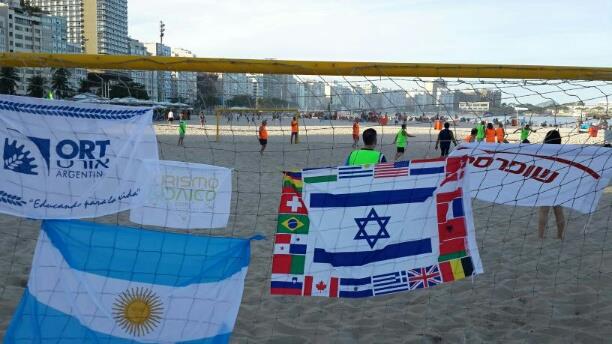The Jewish guide to the World Cup
Published June 16, 2014

Among the Jewish meet-ups at this year’s World Cup: a Saturday soccer game on the beach in Rio de Janeiro. (Courtesy Turismo Judaico)
ADVERTISEMENT
Israel’s not in the World Cup, and none of the star players is Jewish. But never fear: We still managed to compile a list of six Jewish things about Brazil 2014.
The coach: Jose Pekerman, the coach of Colombia’s team, is an Argentine Jew. Pekerman, 64, was born in Villa Dominguez, one of the main centers of Jewish immigration in Argentina; his grandparents emigrated from Ukraine.
The adoptive mother: Mario Balotelli, a key player in Italy’s victory over England last Saturday, was adopted and raised by a Jewish family. His adoptive mother, is the daughter of a Holocaust survivor. At the Eurochampionship 2012 Balotelli dedicated the two goals he scored in Italy’s 2-1 semifinals victory over Germany on June 28 to his Jewish mother.
The shmoozing: Argentine husband-and-wife team Mariano Schlez and Paola Salem have coordinated 14 Jewish gatherings for fans attending the World Cup, including Shabbat evening prayers, beach soccer games leading into Saturday-night Havdalah services and Jewish heritage tours. h.
The philo-Semite: Argentine Lionel Messi traveled to Israel in 2013 with the Spanish Football Club Barcelona as part of the team’s “peace tour.” In 2011, he participated in a campaign for justice and memory of the victims of the 1994 AMIA Jewish center bombing.
The Nigeria-Israel connection: Austin Ejide, a Nigerian goalkeeper, currently plays for the Hapoel Beer Sheva soccer team in Israel and played three years for Hapoel Petah Tikva, another Israeli team.Juwon Oshaniwa , another member of the Nigerian national team, also plays in Israel.
The Israeli fans: Israelis have purchased more tickets per capita than citizens of any other country without a team in the games. The number of tickets sold to Israelis through FIFA’s website – 11,222 (tickets were limited to 17 per individual, and allocated via a raffle system) puts Israel second after Canada in ticket sales among countries without a team to root for.
![]()














